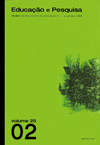Origins and prospect of Paulo Freires pedagogical-political thinking
DOI:
https://doi.org/10.1590/S1517-97021999000200003Keywords:
Freires thinking, Dialogue, Consciousness, Political-pedagogicalAbstract
This paper intends to examine the relationship between education and politics along the construction of the Paulo Freires discourse. With this respect, the paper deals with the relationship between Freires proposals and the "developmental nationalism" movement, and with the populism of the 50s and 60s. The main theoretical influences on this first phase of Paulo Freires are pointed out, in particular the existentialist and personalist veins upon which his progressive Christian thinking is based, and the influences of the intellectuals from the ISEB. The paper then seeks to identify Freires further theoretical development, beginning with the modifying influences of the Marxism. Other theoretical influences - Marx, Hobsbawn, Goldman, Lukács, Gramsci and Sartre - combine with Freires critical and self-critical thinking to produce a "new" Freire, a time in which his discourse is engaged in the concern with the "politicity of education" and with the educability of politics. In this sense, the issue of the inseparability of education and politics and their specifics is discussed. Finally, some of the possible syntheses of Freires thinking are examined, and an itinerary of his origins and of his pedagogical- political perspective is outlined. Intrinsic to the making of this paper is the belief that it deals with one of the most important pedagogical contributions of the twentieth century that, as such, constitutes an educational proposal that is necessary to our future as an autonomous society, hopeful and dialogic, although permanently outraged at the violation of human rights and at social injustice.Downloads
Download data is not yet available.
Downloads
Published
1999-07-01
Issue
Section
Articles
License
Authors assume exclusive responsibility for the concepts expressed in their articles, which do not necessarily reflect the journal’s opinion.
Permission to photocopy all or part of the material published in the journal is granted provided that the original source of publication be assigned.
How to Cite
Origins and prospect of Paulo Freires pedagogical-political thinking . (1999). Educação E Pesquisa, 25(2), 25-37. https://doi.org/10.1590/S1517-97021999000200003



